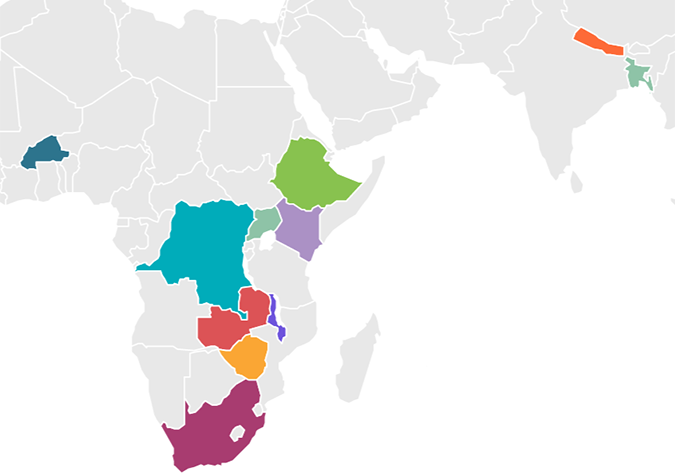Over £550,000 has been awarded through our Partnership Funding to 12 projects in the first call for Catalyst Grants. The one-year projects span eleven countries in Africa and South Asia, and will work at the interface of water security and poverty reduction research and practice.
Rosanna Bartlett, REACH Partnership Funding Manager, said: ‘I’m delighted to announce these new projects which will advance REACH’s goal to improve water security for five million poor people. They have been chosen both for their novel science ideas and potential to deliver significant and sustainable impact.’
Dr Rob Hope, REACH Director, said: ‘Our understanding of water security moves beyond siloed and traditional approaches which separate drinking water services from water resources. We’re pleased to see many of these projects addressing these under-researched linkages, which will unlock opportunities for both human development and economic growth.’
There will be at least one more call for Catalyst Grants (£10,000-50,000), as well as a call for Major Grants (up to £500,000) during the course of the REACH programme. These will be announced on the Partnership Funding page.
FUNDED PROJECTS
Sensor technology for rapidly assessing water quality risks for vulnerable users (TRIGR)
Malawi
British Geological Survey, University of Malawi – The Polytechnic, WaterAid, Chelsea Technologies Group
Co-occurrence of heavy metal and antibiotic resistance in microorganisms due to arsenic contamination in water insecure areas of Bangladesh
Bangladesh
International Centre for Diarrhoeal Disease Research, Bangladesh (icddr,b), Swiss Federal Research Institute for Aquatic Science and Technology (EAWAG), Oregon State University, Emory University
Enhancing the Delta Dynamic Integrated Emulator Model and concepts to support REACH goals
Bangladesh
University of Southampton, Institute of Water and Flood Management (IWFM) at the Bangladesh University of Engineering and Technology (BUET)
Arsenic Precision Innovative Rapid Easy-to-use Test (AsPIRE Test)
Bangladesh
The Bio Nano Centre Limited, University of Dhaka
Livelihoods from Enhanced water Access for the Poor in Slums (LEAPS)
Uganda
Loughborough University, National Water and Sewerage Corporation
Understanding women’s water, sanitation, and hygiene (WASH) vulnerability
Burkina Faso
Stockholm Environment Institute, CEFAME
Water security risk science: local monitoring for participatory resource management (AMGRAF-WSRS)
Ethiopia
Newcastle University, International Water Management Institute
Pastoralist women and water: understanding the ways in which women’s disempowerment contributes to water security risks
Kenya
Centre for Humanitarian Change (CHC), Northern Rangelands Trust
Target Towns Research Action Programme (RAPTT)
Zambia
London School of Hygiene and Tropical Medicine (LSHTM), Centre for Infectious Disease Research in Zambia (CIDRZ), Oxford University, University of Leeds, Georgia Institute of Technology
Expanding supply and local demand of safe water at water kiosks in Goma, DRC through improved monitoring of information (SHIELD)
Democratic Republic of Congo
SeeSaw, Humanitarian Assistance for Development NGO
Establishing a water quality monitoring network in mid-western Nepal
Nepal
Eawag, HELVETAS Swiss Intercooperation
Water law reform to improve water security for vulnerable people in Africa (SELARE)
Kenya, Malawi, Uganda, Zimbabwe, South Africa
Pegasys Institute, International Water Management Institute (IWMI)

